NEWS
Degree Mills Fallout: FG vows to deal with ‘Criminals’ with Fake Degrees

By Eddy Ochigbo, Abuja
Sequel to the upsurge of questionable degrees in Nigeria, the Federal Government has set up a committee to look into the activities of private universities established in the last 15 years to unravel the identity of those the Minister of Education, Professor Tahir Mamman described as criminals parading fake degrees in the country.
The Minister who made this known on Tuesday in Abuja while inaugurating the committee, said the findings of the committee would show if the private institutions under investigation have in place prescribed facilities, adequate management structure and adequate funding of programmes as stipulated by the National Universities Commission (NUC).
Tahir revealed that the inter-ministerial committee set up to look into the activities of illegal universities would examine among other things, the veracity of the allegations of degree certificate racketeering within and without.
“We must ensure our degrees are not only genuine but qualitative to meet up with global standards of education”, the minister told the 7-member newly inaugurated committee, assuring that the ministry would provide the necessary logistics for the Committee to carry out its mandate smoothly.
He said setting up the committee became absolutely necessary to protect “those of us who have worked very hard to earn our degrees.”
The investigative panel’s terms of reference are as follows: “Examine the veracity of the allegations of degree certificate racketeering within both foreign and local private universities in Nigeria; Review the role of any MDA or its officials (including identifying such officials) in facilitation of the recognition and procurement of the fake certificate in question; Review existing policies and procedures related to accreditation and certification to identify weaknesses contributing to the issue.
Examine the rules, procedures and processes for recognition and accreditation of foreign universities and programmes by the Federal Ministry of Education; establish if unapproved foreign institutions (Degree Mills) exist or not in Nigeria in whatever form with their identities and locations if any; make appropriate recommendations for review of any rules, procedures, processes to prevent re-occurrence and sanctions for identified erring officials; make other recommendation that will strengthen the system of recognitions, accreditations and quality assurance of degrees in Nigeria; examine the extant rules procedures and processes for granting of provisional licences to new universities by the National Universities Commission (NUC); and examine the procedures and processes for periodic accreditation of programmes in the universities by the NUC and examine their effectiveness in quality assurance of the programmes.
Without prejudice to the periodic accreditation exercise of the NUC, examine whether or not private Universities established in the last 15 years have in place prescribed facilities, appropriate management structure, adequate funding of programmes, requisite staff (nature of staff-full time, contract, adjunct, visiting, other types).
The committee members include: Prof Jibril Amin (Chairman), Dr Chris Maiyaki, Acting Executive Secretary NUC, Ambassador Lazarus Kpasaba, Ministry of Foreign Affairs and Omeh Nwokpoku, Office of National Security Adviser.
Others are: Amina Mohammed Lugga, Federal Ministry of Youth Development and Mrs Doom Iyortyorm of the Joint Admissions and Matriculation Board (JAMB).
The committee has two months to conclude its assignment.
Foreign News
Israel Vows to Build Jewish Settlements, Rejects Macron’s Call for Palestinian State

“Do not threaten Israel with sanctions” as it will continue to build a “Jewish state” on the ground,” Israeli Defense Minister, Israel Katz, warned on Friday.He also rebuffed a call by French President Emmanuel Macron for establishing a Palestinian State.In open defiance of international law, Katz claimed that world powers may recognize a Palestinian state “on paper.
”Katz made the remarks during a visit to Sa-Nur, an illegal outpost in the northern West Bank that the Tel Aviv government recently decided to officially designate as a settlement for illegal Israeli settlers. In a direct message, Defense Minister Israel Katz targets French President Macron and European allies.He also dismissed the potential international consequences.He said: “They will recognise a Palestinian state on paper, while we will build the Jewish Israeli state on the ground.“Don’t threaten us with sanctions. You will not make us bow.“The State of Israel will not kneel before threats.”His comments came hours after President Macron stated that recognising the State of Palestine was a “moral duty”.Macron also reiterated that France may move toward official recognition during an upcoming international conference focused on the two-state solution.Earlier this week, Israeli newspaper Yedioth Ahronoth reported that the Israeli Security Cabinet had secretly approved the establishment of 22 new illegal settlements in the occupied West Bank.In response, the Israeli anti-settlement group Peace Now issued a statement Thursday, revealing that 12 of the newly approved settlements were previously unauthorised outposts and farming sites established in recent years.According to Peace Now, there are currently 156 illegal settlements and 224 outposts across the occupied West Bank, including East Jerusalem, with over 736,000 illegal Israeli settlers living on occupied Palestinian land.The international community, including the UN, considers the Israeli settlements illegal under international law.The UN has repeatedly warned that continued settlement expansion threatens the viability of a two-state solution, a framework seen as key to resolving the decades-long Palestinian-Israeli conflict.In July 2024, the International Court of Justice declared Israel’s decades-long occupation of Palestinian land illegal and demanded the evacuation of all existing settlements in the West Bank and East Jerusalem.(AA/NAN)NEWS
Stock Market Sheds N48bn Amid Sell-offs

The stock market on Friday closed the week on a bearish note, as key performance indicators dipped by 0.07 per cent.Specifically, the market capitalisation declined by N48 billion, or 0.07 per cent, to N70.462 trillion from N70.510 trillion recorded on Thursday.The All-Share Index also dropped by 0.
07 per cent or 76.07 points to close at 111,742. 01 down from 111,818.08 posted on Thursday. The decline was largely attributed to sell-offs in heavyweight stocks like Beta Glass, NCR Nigeria, Conoil, Legend Internet and 33 others.Also, the market breadth closed negative with 37 stocks declining against 28 gainers.On the flip side, Beta Glass declined by 10 per cent, closing at N232.65 while NCR Nigeria also lost by 10 per cent, finishing at N6.57 per share.Conoil dropped by 9.99 per cent, settling at N298.10 and Legend Internet fell by 9.94 per cent, closing at N6.16 per shareAlso, Industrial Medical Gases shed by 9.91 per cent, ending the session at N33.65 per share.On the gainers’ chart, Omatek grew by 9.86 per cent, settling at 78k while Red Star Express climbed by 9.62 per cent, closing at N8.32 per share.Deap Capital Management rose by 9.38 per cent, finishing at N1.05 and Sovereign Trust Insurance soared by 9.09 per cent, ending the session at N1.08 per share.May and Baker also increased by 8.26 per cent, closing at N11.80 per share.A total of 1.90 billion shares valued at N64.14 billion were traded across 18,653 transactions, in contrast to the 556.45 million shares worth N17.17 billion exchanged across 18,505 deals on Thursday.Transactions in the shares of United Bank for Africa topped the activity chart with 1.41 billion shares worth N49.02 billion.United Capital followed with 66.84 million shares valued at N1.32 billion while Access Corporation sold 53.97 million shares worth N1.19 billion.Fidelity Bank traded 31.38 million shares valued at N606.09 million and Zenith Bank transacted 29.93 million shares worth N1.46 billion. (NAN)NEWS
Customs Intercepts 39,425 Litres of Smuggled Petrol

The Comptroller-General of the Nigeria Customs Service, Bashir Adeniyi, said Operation Whirlwind intercepted 39,425 litres of petrol worth ₦39.4 million within Lagos-Ogun axis. Mr Adeniyi disclosed this on Friday at a news conference in Lagos, organised following recent petroleum product seizures by Operation Whirlwind at the Federal Operations Unit, Ikeja.
Represented by the National Coordinator of Operation Whirlwind, Asst. Comptroller-General Hussein Ejibunu, Adeniyi said it marked another milestone by operatives in the Lagos-Ogun axis. He attributed the success to officers’ dedication, commitment and resilience over the past year within the zone. Adeniyi said the Office of the National Security Adviser, NMDPRA, and Attorney General’s office all commended Customs’ efforts in intercepting smuggled petroleum products. He said, “On May 23, we were in Yola for a similar exercise where over 46,000 litres of seized PMS were auctioned. “Today, we are conducting another auction following seizures made at Laro, Imeko, Badagry, Owode, Ajilete, and other flashpoints.” He added that investigations confirmed the petrol was intended for smuggling into Benin Republic. A total of 1,577 jerrycans of 25 litres each — amounting to 39,425 litres — were seized, along with eight vehicles used for transportation. Adeniyi stated that the seized petrol had a duty paid value of ₦39.4 million, and the vehicles were valued at ₦24 million, totalling ₦63.4 million. He reiterated that there was no safe haven for smugglers, and Customs would continue disrupting illegal activities to the barest minimum. The CGC directed that the seized petrol be auctioned immediately to Nigerians in 25-litre jerrycans at ₦10,000 each. He thanked strategic partners—ONSA, the Attorney General’s office and NMDPRA—for their unwavering support and cooperation. Adeniyi added that the success of Operation Whirlwind was due to strong collaboration with these agencies. “Since Operation Whirlwind began in 2025, Customs officers have not fired a single shot, and four suspects are currently facing trial,” he said. Comptroller Charles Orbih, Zonal Coordinator, Zone ‘A’ of NCS, reaffirmed the service’s commitment to protect Nigeria’s economy and ensure policy benefits reach all citizens. He noted that every litre smuggled across the borders causes revenue loss, scarcity, market instability and weakens energy security. “Operation Whirlwind, launched by the National Security Adviser’s office, proves Nigeria Customs is capable of defending and securing the nation’s borders,” Orbih stated. Comptroller Muhammed Shuaibu, FOU Zone ‘A’, commended Customs Management for the success achieved during Operation Whirlwind. He said the seizure was a joint effort by officers committed to combating smuggling and protecting the nation’s borders. He added that the seizure would help revive the economy, and Customs would maintain its focus on revenue generation and supporting legitimate trade. Mr Patrick Musa, of the NSA’s Lagos Zonal office (NMDPRA), said the operation proved Customs’ competence in border protection. He noted that NMDPRA, mandated with petroleum distribution, would continue collaborating with Customs and other agencies to stop petrol smuggling. Mrs Abidemi Aluko, representing the Attorney General’s office, appreciated the CGC, Customs officers and partner agencies for curbing petrol smuggling. “This is not business as usual. Suspects are currently under investigation for illegal petroleum dealings and will face trial,” she said. Quoting relevant laws, she stated the offence carries a sentence of life imprisonment or a fine, including forfeiture of transport means. “The Federal Government remains committed to prosecuting and bringing to justice those involved in petrol smuggling,” Aluko added. She called on sister agencies and stakeholders to strengthen collaboration to fight economic sabotage. In his closing remarks, ACG Kola Oladeji thanked the CGC for his leadership and enabling environment that contributed to the operation’s success. Oladeji urged officers to stay committed and intensify efforts to enhance national security. (NAN)

























